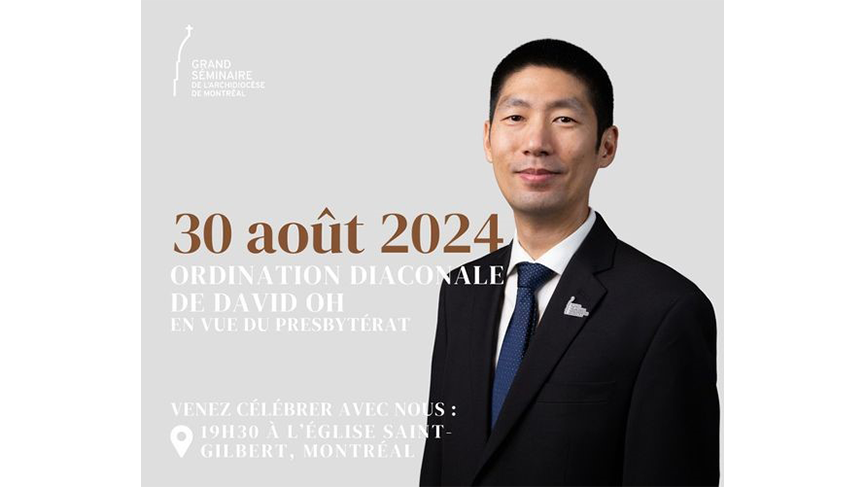Diaconal ordination of David Oh and Sébastien Merveil Kadiata Ilunga

Montreal
The ordination to the diaconate of David Oh, a seminarian of the Archdiocese of Montreal, and Sébastien Merveil Kadiata Ilunga, a seminarian of the Society of the Missionaries of the Holy Apostles, will be presided over by Mgr Alain Faubert, Auxiliary Bishop of the Archdiocese of Montreal, on Friday, August 30, 2024, at Saint-Gilbert parish.
Please keep David and Sébastien in your prayers as he begins this new ministry. Come one, come all to accompany him in this important moment!
About David Oh
I was born in Seoul, South Korea, and grew up in California, where I did most of my schooling, from third grade to a bachelor's degree in electrical engineering. I then lived in Vancouver for several years, where I worked as a technician repairing computers. I also experienced monastic life through vocational discernment in two different communities, one in British Columbia and the other in Quebec, spending about a year in each. When I was working as a technician in Vancouver, I often went to a monastery on Sundays because I was attracted by a life entirely dedicated to God in prayer and holiness. Although I eventually discerned that this was not my vocation, I was deeply marked by these experiences. As I persevered in my search for the vocation to which God was calling me, I found myself at the Major Seminary of the Archdiocese of Montreal.
I'm a seminarian for the Archdiocese of Montreal, in a year of pastoral insertion at Saint-Gilbert parish. One of my favorite biblical passages is: “Abide in me, as I in you” (Jn 15:4).
What does “transitional” diaconate mean?
In the Catholic Church, the diaconate can be lived in either of two ways. The deacon who is chosen for the service of the Church may be ordained as a “transitional” deacon, meaning he intends to enter the priesthood, or as a “permanent” deacon.
A candidate who is ordained with the intention of becoming a priest pursues his formation in order to take up the ministerial priesthood. He will be authorized to preach at Eucharistic celebrations and to preside at baptisms and marriages. He is called to develop the ministry of collective prayer and to exercise his ministry among the poor and the less fortunate. The Church requires that the passage from transitional to permanent diaconate should be completed after a minimum of six months.
The sacrament of the order is comprised of three distinct ministries. In the rite of ordination for bishops, priests and deacons it is expressed as follows: “Thus the divinely established ecclesiastical ministry is exercised on different levels by those who from antiquity have been called bishops, priests and deacons. The bishops, “covered with the plenitude of the sacrament of the order” by the Holy Spirit that has been given to them in the ordination, “were constituted of true and authentic masters of the faith, pontiffs and pastors,” and as such, preside over the flock of the Lord’s in the person of the Christhead.” The function of the ministerial priesthood is to collaborate with the bishops in the pastoral ministry. The priests are invited, in the first place, to proclaim the Good News of Jesus Christ to all; and in the second place, they are charged with the celebration of the sacraments: particularly those of Baptism, Reconciliation, the Eucharist, Anointing of the Sick and Marriage; and in the third place they are to guide the Christian communities.
Deacons, in communion with the bishop and priests, receive the ministry of Service to the People of God for the Liturgy, the Ministry of the Word, and Charity.
There are several commitments made by deacons preparing for the priesthood: that of celibacy, celebration of the Liturgy of the Hours (also known as “the Breviary”), obedience to the bishop, the service of charity and the proclamation of the faith in the Tradition of the Church.
As the Rector of the Grand Séminaire de l’Archidiocèse de Montréal points out, “the deacon is the person who incarnates in his life the testimony of Christ the Shepherd, who announces the Word of God to all, and especially to those inhabiting the peripheries of our world. He is called to the ministry of charity, paying particular attention to the sick, the poor and those who are excluded. He is called to the service of the altar to remind us that the servant’s model is always Christ.”
YOUTUBE LIVE: https://youtube.com/live/nEmm-pAeGMU
GSAM Events link: https://gsam-montreal.org/evenements/
Facebook link: https://www.facebook.com/GSdMtl

Comment
Comment
Add new comment